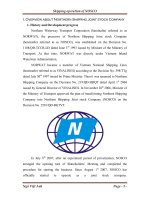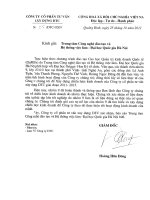Summary of Law PhD thesis: Representation of joint stock company under the law of Vietnam
Bạn đang xem bản rút gọn của tài liệu. Xem và tải ngay bản đầy đủ của tài liệu tại đây (715.66 KB, 27 trang )
VIETNAM ACADEMY OF SOCIAL SCIENCES
GRADUATE ACADEMY OF SOCIAL SCIENCES
--------
LE VIET PHUONG
REPRESENTATION OF JOINT STOCK
COMPANY UNDER THE LAW OF VIETNAM
Major
: Economic Law
Code
: 9 38 01 07
SUMMARY OF LAW PHD THESIS
HANOI, 2018
The work was completed at
GRADUATE ACADEMY OF SOCIAL SCIENCES
Scientific Supervisor: Assoc. Prof. PhD. Tran Dinh Hao
Reviewer 1: Prof. PhD. Tran Dinh Hao
Reviewer 2: Assoc. Prof. PhD. Nguyen Duc Minh
Reviewer 3: Assoc. Prof. PhD. Duong Dang Hue
The dissertation will be defended before the thesis review
council of the Academy at the Graduate Academy of Social Sciences
at
hour minute, day month year.
The thesis can be found at:
- National Library of Vietnam
- Library of Graduate Academy of Social Sciences.
1
PREAMBLE
1. The urgency of the topic
Representation in general and representation of Joint Stock
Company (JSC) is a topic of legal and economic science that is early
interested in the world. Although there are regulations on representation of
JSC in the law of Vietnam, but compared with the laws of developed
countries, there are many incompatible points. Awareness of status and the
role of the representative in a JSC is not uniformly understood; some new
regulations need to be specifically studied on the conditions of application;
the internal control mechanism has not really promoted its role as expected;
the support mechanism for law enforcement on representation of JSC has
not been effective.
This situation shows that it is necessary to continue improving the
law and mechanism of law enforcement on representation of JSC in our
country. Therefore, the research on representation of JSC under the law of
Vietnam currently is very necessary in order to continue improving the
legal regulations on enterprises.
2. The research purpose and tasks of the thesis
The research purpose
The thesis studies the theoretical and practical issues surrounding the
regulations on representation of JSC, thereby forming basic theory, builds
scientific foundations, and proposes solutions to amend and supplement to
improve the law on representation of JSC in Vietnam today.
The research tasks
In order to achieve the above objectives, the author identifies the
following research tasks: Analysis, clarification of the basic theory on
representation of JSC; analysis, evaluation of current legal status on
representation of JSC in Vietnam; identification of the needs and views of
improving the law on representation of JSC, thereby giving recommendations
2
on improving the law as well as perfecting the mechanism of law enforcement
on representation of JSC in Vietnam today.
3. Research object and scope of the thesis
Research scope of the topic
The thesis limits the research representative scope of JSC under the
provisions of Business Law 2014 and Civil Code 2015.
Research object of the topic
The thesis focuses on studying legal provisions on representation of
JSC under the law of Vietnam at present and current legal mechanism to
enforce the law on representation of JSC in Vietnam.
4. Methodology and research methods of the thesis
Based on the methodology of dialectical materialism and historical
materialism, the thesis uses the following research methods: Normative
analysis method; comparative law; legal economics; information collection;
in addition, the thesis also uses a number of specific methods including
analysis, synthesis, historical method, etc.
5. New scientific contributions of the thesis
The thesis has the following major new contributions:
5.1. In terms of theory, the thesis contributes to clarifying a number of
basic theoretical issues on representation of JSC.
5.2. On assessing the current state of law and applying the law on
representation of JSC in Vietnam today
The thesis has pointed out the progressive and appropriate points as
well as the limitations and inadequacies of the law of Vietnam on
representation of JSC.
5.3. Some new proposals contributing to the improvement of law and the
implementation of law on representation of JSC
Through studying, analyzing and evaluating the limitations and
inadequacies of law and the implementation of law on representation, the
3
thesis has proposed a number of solutions to improve the law on
representation of JSC; perfecting the law enforcement mechanism for
representation of JSC; and other support solutions.
6. Theoretical and practical significances
Theoretical significance, the thesis will supplement and contribute
to enriching the theory about representation of JSC.
Practical significance, the research results of the thesis has a
valuable research and reference for law-making bodies, training institutions
and JSCs.
7. Structure of the thesis
Chapter 1: Overview of the research situation and issues related to
the thesis
Chapter 2: Theoretical issues of representation and the law on
representation of JSC in Vietnam
Chapter 3: Legal status of representation of JSC in Vietnam today
Chapter 4: Solutions to develop and implement the law on
representation of JSC in Vietnam today.
4
Chapter 1
OVERVIEW OF THE RESEARCH SITUATION AND ISSUES
RELATED TO THE THESIS
1.1. Overview of the research situation related to the thesis
New approaches in the areas of scientific topics at ministry and
facility levels, theses, dissertations and group articles:
Existing theoretical studies on representation of JSC; existing studies
on the status quo of representation of JSCs; research situation on solutions
and recommendations to improve the law on representation of JSC in
Vietnam today.
1.2. General assessment of the research situation related to the thesis
topic
There is a general point: have formed the theoretical basis of
representation, confirmed the role and the importance of representation in
companies in general and a JSC in particular;
1.3. The issues will be clarified in the thesis
It deepens the understanding of representation of JSC under the law
of Vietnam; studies and evaluates the law on representation of JSC in
accordance with Civil Code 2015 and Business Law 2014, in comparison
with representation institutions of JSC in the law of some countries,
pointing out unreasonable, contradictive and overlapping points; collects
additional data on representative relationship in JSCs in Vietnam as
evidence of the arguments as well as finds out the gaps between the law
and practice of such regulations; proposes more solutions to contribute to
improving the representation institutions as well as promoting the role of
representative of JSC under the law of Vietnam.
1.3. Theoretical foundation and approaches of the thesis
General theory and specific theory, approaches and contents of the
topic; analytical framework to clarify the theory; systematic approach,
5
multidisciplinary approach, interdisciplinary approach, historical approach,
logical approach, etc.
Conclusion of chapter 1
At present, there are more and more research works on
representation in general and representation of JSCs in particular. Authors
focus on resolving the issues of representative theory and the separation
between the owner and the representative, as well as the monitoring
mechanism to ensure that the representative fully and seriously fulfils
his/her obligations; domestic authors also study, compare and learn
corporate management experience of advanced countries, proposes
directions to improve the law on representation of JSCs in Vietnam.
The research works have analyzed and evaluated the actual situation
of institutional framework, legal policy of each country, territory and have
similar points when assessing the actual situation, existence, limitations as
well as propose solutions to improve the institution, policy on
representation of JSCs. These values help the author reinforce perceptions
as the basis for identifying the research results that the thesis will inherit,
the problems that have not been solved by the research works or need to be
further studied. Theoretical knowledge on the need for solutions and
acquisition of international experience on this issue are important
documents for comparative study between Vietnam and some other
reference countries when proposing effective solutions for this issue in our
country.
6
Chapter 2
THEORETICAL ISSUES OF REPRESENTATION AND THE LAW
ON REPRESENTATION OF JSC
2.1. Theoretical issues of representation and JSC’s representation
2.1.1. Conception of representation and JSC’s representation
In history, the conception of representation has been formed and
developed quite early and become an important institution in the law of
many countries. For representation of JSC, the law on JSC of the developed
countries is interested in representative issue.
2.1.2. Concept of representation and JSC’s representation
2.1.2.1. Concept of representation
Civil Code 2015 defines: “Representation is the fact that an
individual or legal entity (hereinafter referred collectively to as the
representative) establishes or implements civil transactions on behalf of
and for the benefit of other individual or legal entity”
2.1.2.2. Concept of JSC’s representation
Scientifically, in the broadest sense, representation of a JSC,
including legal representation and authorized representation, is the
relationship between the representative and the JSC, accordingly, the
representative identifies or implements transactions within the scope of
activities of that Company on behalf of and for the benefit of the JSC.
2.1.3. Classification of the representatives of a JSC
2.1.3.1. General criteria for classifying representatives
There are various criteria for classifying representatives such as:
authority, authorization nature, independence in representation, etc.
2.1.3.2. Specific classification of the representatives of a JSC
First: Legal representative of a JSC
The legal representative of a JSC is an individual acting on behalf of
7
the Company to exercise rights and obligations arising from the Company’s
transactions, represents the Company as plaintiff, defendant, person with
related rights and obligations to the arbitration, the court and other rights
and obligations as prescribed by law.
Second: Authorized representative of JSC
The authorization in a JSC includes internal authorization
(authorized to manage the Company’s internal activities) and external
authorization (authorized to act on behalf of the Company to perform its
rights and obligations with third parties).
2.1.4. The role of the representative of a JSC
The legal representative of company is one of the legal conditions for
the company to operate normally, plays a very important role in
establishing and implementing the Company’s rights and obligations.
2.1.5. Obligation to comply with ethical standards of the representative of
JSC
The professional ethics of a representative include: i) Loyalty; ii)
Honesty, prudence; iii) Compliance with the Company’s orders and
reasonable instructions; iv) Keeping information confidential; v) No
conflict of interest with the represented person.
2.2. Theoretical issues on the regulatory scope for the representative
relationship of JSC
2.2.1. Representative scope and authorization of JSC
The basis for determining the representative scope and authorization
is usually based on the Company’s Charter, the decision of competent
authority or authorization contents. Where it is not possible to specifically
identify the representative scope, the legal representative shall be entitled to
8
establish and conduct all civil transactions for the benefits of the
represented person.
2.2.2. Rights and obligations of the parties in the representative relationship
of JSC
2.2.2.1. Obligations and liabilities of representative for JSC
The obligations include: exercising rights and duties within the
scope of representation; being honest, careful; be loyal to the company’s
interests; not use information, know-how, business opportunities, position,
and assets of the company for self-interest or for the benefit of other
organizations or individuals; complying with competition restrictions with
the company; preservation of assets and documents assigned by the
company.
- Regarding the handling of the representative’s liabilities for JSC
when committing acts of violations: determining the liabilities of JSC’s
representative must be based on the provisions of law, the company’s
Charter, labor contract or power of attorney.
2.2.2.2. Obligations of the represented person to the representative
The represented person (JSC) has a number of obligations to the
representative such as: obligation to pay representative remuneration and
reimburse relevant costs; obligation to provide information, documents,
assets, and tools necessary for the representative to perform the
representative
obligations;
obligation
not
to
interfere
with
the
representative’s operations.
2.2.3.3. Obligations, liabilities of the representative and JSC to the third
party in the transaction established and performed by the representative
In principle, if the representative carries out the representative
obligations within the representative authorization, then the company shall
be responsible for the rights and obligations to the third party, and the
representative shall be released from liability to the third party and to the
9
JSC. Except for the absence of the right to represent or exceeding the
representative scope and authorization.
2.2.3. Representation term and termination of the representative
relationship of JSC
2.2.3.1. Representation term of JSC
Representation term means a defined period of time that the
representative is authorized by the represented person to exercise the
representative work.
2.2.3.2. Termination of representative relationship of JSC
The representative relationship between a JSC with its representative
terminates in the flowing cases: As agreed between the representative with
the JSC; expiration of representation term; representative purposes have
been achieved; termination due to legal events (death, loss of civil act
capacity,
imprisonment);
either
party
unilaterally
terminates
the
representative relationship; other bases as prescribed by law.
Conclusion of chapter 2
Chapter 2 of the thesis studies common perceptions about the
representation of JSC, thereby showing that: Most of developed countries
have relatively strict regulations on representation of a company; the
principle of free agreement in the representative relationship of JSCs is the
basis for the formation of common standards such as obligations and
liabilities of the parties in the representative relationship and in relations to
the third parties; representative scope and authorization; representation
term and termination of representation. Legislation creates a legal corridor
for the free formation of representative relationship, and respect the
agreement in the spirit of goodwill.
Contents of chapter 2 have solved a number of questions raised in the
part of theoretical basis of the thesis, namely: Concept, characteristics,
10
classification of representation of JSCs; the role of representative; rights
and obligations of the parties in the representative relationship; the
representative scope and authorization; representation term and termination
of representative relationship. Clarifying the nature of the representative
relationship of JSC, if the representative acts within the scope of
representation, the rights and obligation from that action will legally bind
on the JSC.
From the point of view of the division of social labor, representation
is a highly specialized profession, however, the interest in professional
training and fostering, the formation of ethical rules of representatives and
representative associations has not been fully paid attention by the State,
the investors and the representatives of companies themselves.
11
Chapter 3
LEGAL STATUS OF REPRESENTATION OF JSC
IN VIETNAM TODAY
3.1. The provisions of law on representative models of JSCs in Vietnam
3.1.1. JSC model with only one legal representative
Regarding the representative scope and authorization: the legal
representative is not restricted to the representative scope and authorization
suitable to the business conditions of JSCs registered with the State agency.
3.1.2. JSC model with a number of legal representatives
From Business Law 2014, a LLC and JSC may have one or more
legal representatives. The company’s Charter shall specifies the number,
managerial title, rights and obligations of these legal representatives. In this
model, the determination of the representative scope and authorization
among legal representatives of JSC is a complex issue both in theory and
practice.
3.1.3. Authorization cases of JSC
3.1.3.1. JSC authorizes branches, representative offices
The regulations of authorizing branches and representative offices
have conflicts between Business Law 2014 and Civil Code 2015, as the
branches and representative offices are dependent units of a company and
do not have legal status.
3.1.3.2. JSC authorizes other individuals, legal entities to establish and
perform a specific task, such as: seeking customers, buying or selling
company assets, negotiating contracts, signing contract, recruiting
personnel, advertising; representing the JSC as the plaintiff, defendant,
person with related rights and obligations to the arbitration or the court, etc.
3.1.3.3. The manager of company authorizes other individuals to perform
the duties of the Company’s manager
12
Essentially, this case does not fall within the representative
relationship that JSC is a party in the representative relationship. However,
this authorization relationship is indirectly related to the company’s rights
and interests. Authorization cases of the company’s manager include:
Chairman of the Board of Directors authorizes members of the Board;
Director/General Director authorizes other person to perform the rights of
Director/General Director; members of the Board authorize other persons to
attend the Board meetings; legal representative authorizes another person to
carry out the legal representative’s rights and obligations.
3.1.4. Actual situation of representative model of JSC based on the
position and relationship with the company’s owner
3.1.4.1. Position held by the legal representative in JSC
The majority of companies surveyed selects the model that
Director/General Director is the legal representative (76%); Chairman of
the Board of Directors as the legal representative only accounts for 24%.
All 9 JSCs which have two legal representatives specify Chairman of the
Board and Director/General Director as legal representatives in accordance
with the provisions of Business Law 2014.
3.1.4.2. Legal representative is concurrently the company’s shareholder
The survey results show that 93/106 (87.7%) legal representatives
own shares in JSC which those people are legal representatives. Of the 13
legal representatives who do not own shares in the company (12.3%), some
companies hire Director/General Director and appoint them as the legal
representative; some companies have all shareholders as legal entities or
major shareholder as state-owned entities or legal entity owning controlling
shares, therefore, major shareholders will introduce their representative
participating in the Board of Directors and the legal representative of the
company.
3.1.4.3. Legal representative is concurrently the member of the company’s
13
Board
Although 76% of JSCs select Director/General Director as their legal
representative, but the survey results show that 97.2% of legal
representatives are concurrently members of the member of the company’s
Board of Directors. This shows that companies both promote the role of the
legal representative, and expect the legal representative not only to follow
the resolution of the Board of Directors, but also to take part in the
decisions of the Board and organize the implementation of such decision; at
the same time, shareholders also want to closely control the implementation
of the rights and obligations of the legal representative through the Board
of Directors.
3.2. The provisions of law on establishing the legal status of the
representative in JSC in Vietnam
3.2.1. Establishing legal status of the legal representative of JSC
The grounds to establish legal status of the legal representative
include: (i) Decision of competent authority; (ii) The Charter of company;
(iii) Resolution of the Board of Directors on change of legal representative;
and (iv) Decision of competent court appointing legal representative who
participates in court proceedings in special cases.
3.2.2. Establishing legal status of the authorized representative of JSC
The grounds to establish legal status of the authorized representative
of JSC are usually valid authorization document between the company or
the company’s manager and the authorized person or a power of attorney
between the company and other individuals or legal entities.
3.3. The provisions of law on handling transactions performed by
person without representation rights or beyond representative
authorization scope of JSC
3.3.1. Handling the cases where transactions are performed by person
without the representation rights
14
A person who does not have the representation rights of JSC but
establishes, conducts one or several transactions with a third party on
behalf of the company, in principle, will not be effective for the company.
However, the following cases will still cause rights and obligations of JSC:
(i) The transaction has been acknowledged by the JSC; (ii) The JSC knows
without objection within a reasonable period of time; (iii) The JSC has fault
causing that the third party has not known or could not know the fact that
the person established or performed transaction with him/her does not have
representation right.
3.3.2. Handling the cases where transactions are beyond the
representative authorization scope
Transactions established and performed by the representative but
beyond the representative authorization scope also will not cause rights and
obligations of JSC. Exceeding the scope of representative authorization
may occur in the following circumstances: (i) excess of time; (ii) excess of
space; (iii) beyond the scope of work, representative authorization.
However, the law recognizes three cases of transactions beyond the scope
of representative authorization that may still be effective, including: (i) The
JSC has agreed; (ii) The JSC knows without objection within a reasonable
period of time; (iii) The JSC has fault causing that the third party has not
known or could not know the fact that the person established or performed
transaction with him/her is beyond the representation scope.
3.4. The provisions of law on supervision mechanism of the
representative in JSC
3.4.1. Supervision through the role of the Board of Supervisors
The Board of Supervisors acts as an authorized body on behalf of
the General Meeting of Shareholders to supervise the Board of Directors,
Director/General Director and other officers in the management and
operation of the company. However, the role of the Board of Supervisors is
15
now quite fuzzy, the independence in the inspection is very limited and just
a formality.
3.4.2. Supervision through independent members of the Board of
Directors
Independent members of the Board play an important role in
monitoring, reducing the risk of abuse of rights of the company’s manager.
3.4.3. Supervision through the Board of Directors
The Board of Directors has the right to supervise Director/General
Direct and other officers, including legal representative in performing the
assigned tasks.
3.4.4. Supervision through other mechanisms
Company shareholders can also supervise the company’s
representative through the following methods: Serious and transparent
disclosure of information; direct supervision of shareholders.
3.5. Assessing the legal status and applying the law on representation
of JSC in Vietnam
3.5.1. Assessing the evolution of the law of Vietnam in the regulations on
the representation of JSC
History of representation institution of JSC shows the development
process in both theory and practice. The evolution of the law of Vietnam on
representation institution of JSC is reflected in the following issues: First:
From the fact that the law did not prescribe the existence of a JSC before
the 1990s of the 20th century to the regulations that a JSC has only one legal
representative of the period before 2015, and the recognition of JSC model
with one or more legal representatives is a development process and shows
a clear improvement in the legislative thinking of the state. Second:
Regarding the scope of representative authorization, the law has prescribed
more clearly the grounds for determining the representation scope. Third: A
representative may be an individual or a legal entity. Fourth: Regarding the
16
right to substitute the legal representative under the law of the Board of
Directors, Business Law 2014 specified more broadly. Fifth: The
authorization to appoint legal representative under the law of court is a new
and progressive point. Sixth: More clearly addition on how to define the
representation term. Seventh: Indirectly recognizing representation is a
profession and can commercialize the representative relationship. Eighth:
The application of the law on representation and corporate management
rules is strictly complied by listed JSCs. Ninth: The information disclosure
of JSCs is done by the public companies quite seriously. Tenth, the fact that
the law of Vietnam forces the public companies apply international
standards of corporate management as recommended by the OECD is
considered as a great progress in the process of integration.
3.5.2. Assessing some limitations and inadequacies of the law on
representation institutions of JSC in Vietnam
In addition to the above-mentioned advances, in the implementation
and application of the representation institutions of JSC, there are some
limitations, inadequacies or overlaps in the legal documents, such as:
regulations on the representative’s obligations for the JSC; the JSC’s
obligations for the representative; supervision mechanisms for the
representative; representation scope; representation term; termination of
representation; the regulations on limiting competition with the company in
case the representative is not a member of the Board of Directors,
Director/General Director are opened; inadequacies in JSC’s authorization
regulations to branches, representative offices; the authority to designate
the legal representative of the Court in the case the company participates in
arbitral proceedings.
Conclusion of chapter 3
The regulations on representation of JSC in the law of Vietnam just
appeared in the late 20th century, but along with the process of perfecting
17
the law on JSC, the regulations on representation of JSC have also had
positive developments, showing remarkable progress in legislative
thinking. The current legal regulations on representation of JSC show that
we have not yet established a complete legal framework for this issue. In
each legal regulation on each issue of the representative relationship of
JSC, there are still inadequacies and shortcomings that need to be amended
and supplemented. It is necessary to study the tools, supervision
mechanisms and methods for better supervision for the company’s manager
in general and the company’s representative in particular in order to ensure
that the company’s manager can perform responsibilities, tasks and rights
assigned by the company and the company’s owner in the best manner.
18
Chapter 4
SOLUTIONS TO DEVELOP AND IMPLEMENT THE LAW ON
REPRESENTATION OF JSC IN VIETNAM TODAY
4.1. Orientation to complete the law on representation of JSC
4.1.1. The point of view on the completion of the law on representation of
JSC in Vietnam today
Vietnam needs to develop synchronously, improve the quality and
effectively implement the legal system in general and business law in
particular in order to ensure an equal, transparent competitive environment,
complete
mechanisms
to
help
shareholders
control
the
legal
representative’s behavior in the company.
4.1.2. Orientation to complete the law on representation of JSC in
Vietnam today
Orientation to complete the law on representation of JSC in Vietnam
today is based on the following principles: Firstly: Completing the law on
company in general, representation institution in JSC in particular is an
objective request in order to perfect the socialist-oriented market economy
in our country. Secondly: Completing the law on representation in JSC
should meet the comprehensiveness and synchronism. Thirdly: Ensuring
the freedom of business. Fourthly: Requirements for improving
effectiveness and efficiency in state management of the operation of JSC,
especially public companies.
4.2. A number of solutions to develop and implement the law on
representation of JSC in Vietnam today
4.2.1. Group of solutions to perfect the provisions of law on
representation in JSC
4.2.1.1. Completing the regulations on legal representative of the company
Firstly: Adding regulations that the Board of Directors has right to
19
appoint the legal representative in the case where the JSC has more than
one legal representatives but exit from Vietnam without authorizing other
persons to exercise their rights and obligations, or being imprisoned,
restricted, dead, or lost capacity for civil acts.
Secondly: Adding regulations on legal representation term (by term
or by labor contract).
4.2.1.2. Completing the regulations on authorization of JSC
Firstly: Amending the regulations on the authorized representative of
branches, representative offices of JSC to suit the conditions of the
represented subject.
Secondly: Systematizing the cases of authorized representation in
JSC in order to ensure the tightness and consistency.
4.2.1.3. Unifying the regulations on representation to handle transaction
consequences due to the excess of the scope of representative authorization
and transactions established and performed by a person without authorized
representation
Articles 142 and 143 of current Civil Code have two different ways
of using words that are not uniform and difficult to distinguish between
“recognition” and “consent”, because both words represent that the
represented person recognizes and receives the results from transactions
established and performed by a person not having authorized representation
or beyond the scope of representative authorization without requesting the
declaration of invalidation of those transactions.
4.2.1.4. Completing supervision mechanism of company and shareholders
for the representative’s behavior
Firstly: Completing the regulations on the Board of Supervisors.
The current law mainly gives the Board of Supervisors the right to
control the behaviors of the Board of Directors and Director/General
Director, i.e. the control is attached to the management and operation
20
apparatus but not attached to the functions and duties of the assigned
manager, therefore, if a person who is not the Chairman of the Board of
Directors or Director/General Director is the representative, then the Board
of Supervisors will face difficulties in controlling his/her behavior.
Secondly: Completing the regulations on independent member of the
Board of Directors
In addition to the regulations on quantity, standards, conditions,
procedures to elect and dismiss independent member of the Board of
Directors, the Business Law should supplement specific provisions on the
rights and obligations in supervising and implementing the control of the
management and operation activities in the company; obligations to warn
the Board of Directors of violations of the Chairman of the Board of
Directors, Director/General Director, legal representative or other officers
in the company; obligations to report to the General Meeting of
Shareholders about the control results for the Board of Directors and other
officers, etc.
Thirdly: Improving the quality of audit reports.
In addition to the annual audited financial statements of the JSC, the
law should empower shareholders or the Board of Supervisors or
independent members of the Board of Directors may request another audit
agency to inspect the truthfulness of the data of the company’s financial
statements.
Fourthly: Completing the provisions on competition restrictions of
the company’s manager for the company.
It is inappropriate that the members of the Board of Directors,
Director/General Director must present to the Board of Directors and the
Board of Supervisors, and it is inappropriate that the Board of Directors
and the Board of Supervisors supervise the representative in case the
company have several legal representatives, including persons who are not
21
members of the Board of Directors or Director/General Director. Therefore,
Clause 5 Article 159 of Business Law needs to be amended and
supplemented so that the legal representative is responsible for presenting
to the Board of Directors and the Board of Supervisors on behalf of
himself/herself or other persons to exercise the work within the business
scope of the company.
4.2.1.5. Completing the legal provisions on the representative’s
responsibilities
Business Law should amend and supplement the fact that the
representative is exempt from liability for a breach of representation
obligation if for reason beyond the control of the representative, such as the
representative has done or has not done something on the advice of the
company’s consultants or based on information provided by employees that
he/she has reason to believe that the information is correct.
4.2.2. Solutions to improve the law enforcement mechanism on
representation in JSC
4.2.2.1. Detailed guidance on the issuance of the company’s Charter
Charter is a specific version of the Business Law into each certain
enterprise. The law empowers quite great self-determination for companies
when it allows many of the company’s regulations in the Charter are
different with the general provisions of Business Law, therefore, it is
necessary to study to supplement the Decree guiding the implementation of
Business Law, and specific guidance on the issuance of the Charter related
to the method of electing, appointing or dismissing the legal representative;
standards, conditions, the scope of representation authorization of JSC;
responsibilities of JSC for transactions established or performed by the
representative; the security of JSC for the representative to perform the
task, etc.
4.2.2.2. Improving the State management capacity of competent authorities
22
- Strengthening the inspection and supervision of the competent
authorities’ activities for JSC; consolidating and improving the operation
efficiency of the business registration agency, the State securities
commission, the Stock Exchange, tax agencies, custom agencies, etc.
- Improving the quality of dispute resolution in corporate
management of judicial agencies (court, arbitration).
4.2.2.3. Improving the quality of information disclosure of JSC.
4.2.3. Other support solutions
- Enhancing legal awareness, the sense of respect for the law of
subjects in the representative relationship
- Applying international standards in corporate management.
- Completing the mechanism to assist the JSCs in defining
responsibilities and rights in case the company has more than one legal
representative
- Establishing a profession and skill training program for the legal
representative of enterprises in general
- Developing a code of ethics for the representative.
-
Recommendation
for
the
establishment
of
representative
association
- Recommending that JSCs should have a team of legal advisors
- Ensuring the right to self-defense of shareholders for the violation
of the manager in general and the representative in particular
- Responsibility insurance of the representative
Conclusion of chapter 4
Through the research process, the author draws the following
conclusions: The improvements of the law as well as the application of the
law on representation of JSCs in Vietnam currently contribute to improving
the business performance of JSCs in integration condition; protect legal
23
rights and interests of shareholders and contribute to perfecting the
socialist-oriented market economy in our country. In order to achieve this
objective, it is necessary to base on the right points of view and
orientations, creating the premise for specific solutions, resolving pressing
problems set out by the legal practice on representation of JSC in Vietnam.
The solutions to improve the law on representation of JSC set forth in
Chapter 4 of the thesis derive from the study of legal status on
representation of JSC currently in Vietnam as well as the research of
theoretical bases in this field. The implementation of the solutions does not
only requires the State to amend and supplement the law on representation
institutions but also needs the efforts of the representatives in carrying their
obligations and needs the support and coordination of the State competent
agencies as well as general awareness of the whole society.
CONCLUSION
After studying the law on representation of JSC in Vietnam today,
the thesis draws some conclusions as follows:
1. The results of the document study show existing studies on the
representation of JSC, thereby inheriting the existing results, and selecting
research issues left open for the author’s thesis. Through the document
study, the author can clearly show the theoretical basis, research methods as
a guideline for the implementation of the thesis.
2.
From theoretical issues, the thesis focused on clarifying the
concept, characteristics, classification of JSC’s representation; the role of
representation; rights and obligations of the parties in the representative
relationship, and professional ethics of representative; representative
authorization scope; representation term and termination of representative









